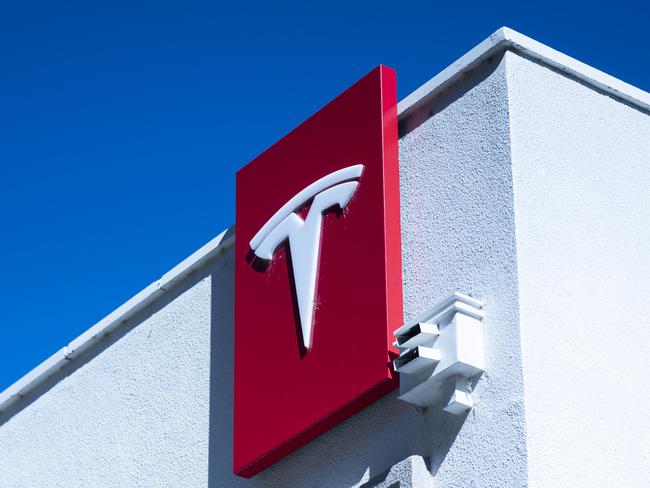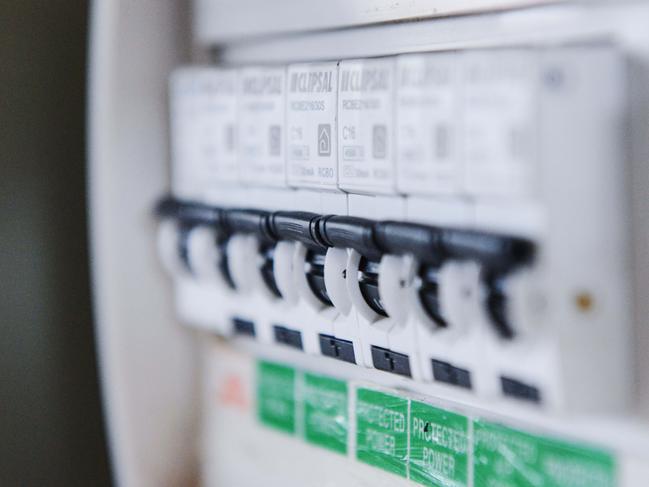‘Fortunate position’: Home batteries a step beyond most budgets
There are increasing calls to narrow the divide between people who can afford to electrify their homes and those who are left in the dark.
Costs
Don't miss out on the headlines from Costs. Followed categories will be added to My News.
Well-to-do Aussies with a green streak are installing expensive batteries in their homes to soak up their solar energy, but not everyone can afford to follow suit.
Units cost upwards of $10,000, so those who can afford it don’t pay power bills and can turn a profit after a few years, while renters and social housing tenants are left in the dark.
One of the lucky few is New South Wales resident James Abbott, who has a 13.5kW Tesla Powerwall out the back of the family’s South Turramurra home in Sydney’s upper north shore.
“I’m in a fortunate position where I can purchase it myself,” Mr Abbott said of the battery that powers the four-person home and a Tesla electric vehicle.
Mr Abbott is appreciative of having the means to buy a battery and is actively involved in a community group that subsidises vehicle-replacing electric bikes.


“It actually works out to be a pretty good investment,” he said of the Tesla battery.
The decisions to get a battery and interest-free loans from governments for the technology were “no-brainers”, Mr Abbott said.
“I’m getting paid a dollar to charge my car,” he said.
NSW has the most meagre battery rebate scheme in the country, but the private sector has stepped in.
The government contributes funding to a private company that offers a discount to 650 homes to create a network of energy-making-and-storing homes, a virtual power plant.
NSW residents receiving an energy rebate may be eligible to swab the rebate for a free solar system.
Victoria has interest-free loans of up to $8800 to install a battery.
And in Queensland, households with an income under $180,000 can get a $3000 rebate.
Households where the highest income earner earnt less than $66,667 can get a $4000 rebate in the Sunshine State.
Mr Abbott is well read on home batteries and keeps a close eye on the work of scientist Saul Griffith, who wants a student loan HECS-style solar scheme, where debt is repaid once the house that received the upgrades is sold.
Dr Griffith is chief scientist at advocacy group Rewiring Australia who has advised the Biden administration on decarbonising.


His idea would cost the federal budget about $2.8bn over the first three years and eventually eliminate about 25 per cent of emissions from households and vehicles in 15 years.
Research from solar advocacy group Solar Citizens shows a gulf has opened between people able to own a home with solar, batteries and an EV, and renters and social housing tenants unable to install hardware to mitigate their own power bills.
Solar Citizens research finds $9.3bn could be saved on power bills across the country if apartments and social housing were fitted with solar.
“Cleaner, cheaper rooftop solar energy is a win for both energy bill relief and reducing climate pollution.
One in three Australian homes has now gone solar. We need greater government support to ensure the financial and health benefits are extended to all Australian households,” Solar Citizens national campaigns director Joel Pringle said.
Renters’ advocate Joel Dignam said everyone should be able to afford the energy they need to lead a decent life.
“But rising rents and energy costs have made this harder for people who rent,” the Better Renting executive director said.
“Access to rooftop solar can make a huge difference in reducing energy costs.”


“Too many renters have been locked out of these benefits at the same time as landlords have been increasing rents to record levels.”
The ACT government has an energy-efficient home scheme, dishing out loans from $2000 to $25,000.
The Northern Territory has grants on the table up to $6000 for batteries.
However, only South Australians in Adelaide can get “incentives for sustainability”.
These are payments for a variety of measures at home, including up to $1000 for a battery and up to $20,000 for shared solar on a block of apartments.
Tasmania has interest-free loans up to $10,000 that can be spent on a battery.
Originally published as ‘Fortunate position’: Home batteries a step beyond most budgets



